The FBI Most Wanted Terrorists is a list created and first released on October 10, 2001, with the authority of United States President George W. Bush, following the September 11 attacks on the United States. Initially, the list contained 22 of the top suspected terrorists chosen by the FBI, all of whom had earlier been indicted for acts of terrorism between 1985 and 1998. None of the 22 had been captured by US or other authorities by that date. Of the 22, only Osama Bin Laden was by then already listed on the FBI Ten Most Wanted Fugitives list.

Saif al-Adel is a former Egyptian colonel, explosives expert, and a high-ranking member of al-Qaeda who is still at large. Adel is under indictment by the United States for his part in the 1998 United States embassy bombings in Kenya.

Fazul Abdullah Mohammed was a Comorian-Kenyan member of al-Qaeda, and the leader of its presence in East Africa. Mohammed was born in Moroni, Comoros Islands and had Kenyan as well as Comorian citizenship. He spoke French, Swahili, Arabic, English, and Comorian.

Abdullah Ahmed Abdullah was a high-ranking Egyptian member of al-Qaeda. He has been described as al-Qaeda's most experienced operational planner and was said to be the second-in-command in the organization at the time of his death.
The Rewards for Justice Program (RFJ) is the counter-terrorism and counterintelligence cyber bounty platform administered by the U.S. Department of State's Diplomatic Security Service agency. The Rewards For Justice program is seeking information leading to the arrest, capture, and identification or location of any foreign person, including a foreign entity, who knowingly engaged or is engaging in foreign election interference, as well as information leading to the prevention, frustration, or favorable resolution of an act of foreign election interference. The Rewards for Justice Program has paid more than $250 million to 125 individuals for leading information that prevented international terrorist attacks or helped bring to justice those involved in prior acts.
Fahd Mohammed Ahmed al-Quso, also known as Abu Huthaifah, Abu Huthaifah Al-Yemeni, Abu Al-Bara', Abu Hathayfah Al-Adani, Abu Huthaifah Al-Adani, Fahd Mohammed Ahmed Al-Awlaqi, Huthaifah Al-Yemeni, or Abu Huthaifah Al-Abu Al-Bara, was alleged to be a terrorist by American and Yemeni officials, and on the FBI Most Wanted Terrorists list. He was wanted by the FBI, Interpol, and the United States Department of State, which had offered 5 million dollars to anyone with information about him. He was killed by a US drone strike in Yemen on 6 May 2012.
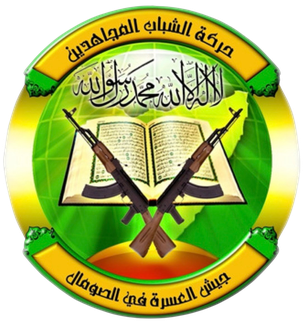
Harakat al-Shabaab al-Mujahideen, more commonly known as al-Shabaab, is an Islamic fundamentalist Salafi jihadist group which is based in Somalia and active elsewhere in East Africa. It is actively involved in the ongoing Somali Civil War. Even though its membership incorporates Somali nationalist elements, al-Shabaab's central aims are Salafi jihadist. Allegiant to the militant pan-Islamist organization al-Qaeda since 2012, it has also been suspected of forging ties with Boko Haram, al-Qaeda in the Islamic Maghreb, and al-Qaeda in the Arabian Peninsula.
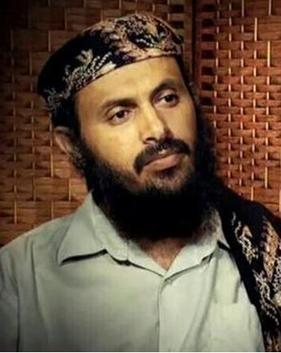
Qasim al-Raymi was a Yemeni militant who was the emir of al-Qaeda in the Arabian Peninsula (AQAP). Al-Raymi was one of 23 men who escaped in the 3 February 2006 prison-break in Yemen, along with other notable al-Qaeda members. Al-Raymi was connected to a July 2007 suicide bombing that killed eight Spanish tourists. In 2009, the Yemeni government accused him of being responsible for the running of an al-Qaeda training camp in Abyan province. After serving as AQAP's military commander, al-Raymi was promoted to leader after the death of Nasir al-Wuhayshi on 12 June 2015.

Mohammed Abdel Karim Al Ghezali is a citizen of Yemen who was one of the founders of Al Qaeda in the Arabian Peninsula, in 2009, and remains one of its senior leaders. CBS News reported that Al Ghezali appeared in a September 2009 fund-raising video with Said Ali Al Shiri, the second in command of Al Qaeda in the Arabian Peninsula.
Ezedin Abdel Aziz Khalil, also known as Yasin al-Suri, is allegedly a senior al-Qaeda facilitator and financier based in Iran, according to the U.S. government. He is in the $3 million reward category in the U.S. Rewards for Justice Program.
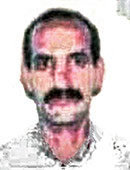
Ibrahim Muhammad Salih al-Banna, known as Ibrahim al-Banna is a citizen of Egypt who security officials suspect is a leader in Al Qaeda in the Arabian Peninsula (AQAP). Security officials have repeatedly claimed to have killed him with missiles launched from unmanned aerial vehicles. An October 2011 claim had al-Banna killed, along with six other individuals, including some who were alleged to have been associated with AQAP and at least one who was not. Ibrahim al-Banna was added to the U.S. State Department's Rewards for Justice wanted list on October 14, 2014.

Muhsin al-Fadhli was an alleged senior leader of Khorasan, an offshoot of the al-Nusra Front, a branch of al-Qaeda.
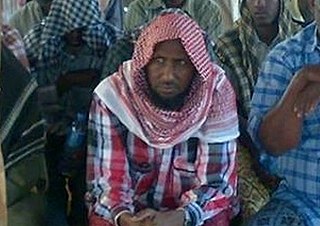
Ahmad Umar, also known as Ahmad Diriye and Abu Ubaidah, is the Boqor of Somalia’s Islamist group Al-Shabaab. He was listed by the U.S. State Department as a Specially Designated Global Terrorist in April 2015. The Rewards for Justice Program currently offers up to 10 million USD for information regarding him.
Tariq bin al-Tahar bin al-Falih al-'Awni al-Harzi, also known as Abu Umar al-Tunisi, was a Tunisian man and senior leader of the Islamic State.

Khalid Saeed Batarfi, also known as Abū al-Miqdād al-Kindī, is a Saudi Arabian militant and the current emir of Al Qaeda in the Arabian Peninsula. He oversaw the Yemen-based group's media network and led jihadist fighters in their takeover of Yemen's Abyan Governorate in 2011, where he was accorded the position of emir. He also reputedly carried out terrorist attacks in the Abyan and Hadhramaut governorates.
Sami al-Oraydi is a senior sharia official for the al-Qaeda affiliated Hurras al-Din and Guardians of Religion Organization, who was the chief religious authority for al-Nusra Front and the group's former second-in-command.
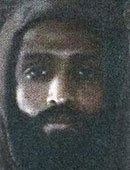
Abdikadir Mohamed Abdikadir, better known as Ikrima, is a terrorist described as one of the most dangerous commanders of the Somali terror organisation Al-Shabaab. He has reportedly been central in the planning of several terror attacks, and responsible for forging links between Al-Shabaab and Al-Qaeda in the Arabian Peninsula (AQAP). He is of Somali ethnicity.
Tarad Mohammad al-Jarba, better known by his kunya Abu Muhammad al-Shimali, was an Iraqi-born citizen of Saudi Arabia and a senior leader of the Islamic State of Iraq and the Levant (ISIL).
Ibrahim Issa Hajji Muhammad al-Bakr is a Qatari Specially Designated Global Terrorist (SDGT) according to the U.S. Department of the Treasury. Al-Bakr also has a history of supporting al-Qaeda and the Taliban through the collection and transfer of funds. Al-Bakr’s fundraising efforts for extremist groups and associations with al-Qaeda operatives and facilitators have led the United Nations and U.S. Department of the Treasury to list al-Bakr as a facilitator of terrorism. Ibrahim al-Bakr’s current location is unknown.

Abu Ubaidah Youssef al-Annabi is an Algerian Islamist jihadi militant who is the current emir, or leader, of the Algerian Islamic militant group Al-Qaeda in the Islamic Maghreb (AQIM), formerly the Salafist Group for Preaching and Combat (GSPC). In November 2020, he was named emir, replacing Abdelmalek Droukdel who was killed during a French special operation during the Battle of Talahandak.